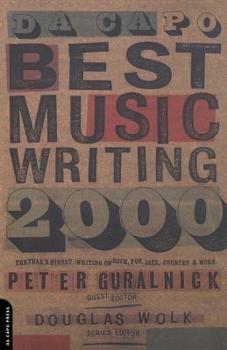Da Capo Best Music Writing 2000: The Year's Finest Writing on Rock, Pop, Jazz, Country and More
(Part of the Da Capo Best Music Writing Series)
Select Format
Select Condition 
Book Overview
This first volume of a new annual series celebrates the year's best American writing about rock, jazz, country, and other genres of music. The 30 selections draw from 100 sources, from "The New... This description may be from another edition of this product.
Format:Paperback
Language:English
ISBN:0306809990
ISBN13:9780306809996
Release Date:August 2000
Publisher:Da Capo Press
Length:448 Pages
Weight:0.30 lbs.
Dimensions:1.1" x 5.5" x 8.5"
Customer Reviews
4 ratings
Superb writing
Published by Thriftbooks.com User , 15 years ago
The mark of good music writing is making you want to go listen (or re-listen) to the music - this book is full of those articles - obviously not all the genres of music were to my taste - but all the articles were interesting enough to make me pay more attention, and so learn more. Outstanding for me was "Make a Joyful Noise" by Geoffrey Himes - through this I found about Sacred Steel music played in churches - this alone was worth the price of admission. The beauty of this series is that one can discover or re-discover music and fall in love all over again.
Fine writing on all genres of music
Published by Thriftbooks.com User , 21 years ago
A collection of great (and maybe not so great) essays on all genres of music, from a day in the life of Puff Daddy to Roseanne Cash remembering the songs her father sang her, to Lester Bangs' criticism, to a superb analysis of Ry Cooder's personality and music. I liked all the pieces, especially the quietly admiring piece on Cooder, the thorough look at the wild life and music of Nigerian musician Fela, and an erudite explanation of the musical legacy of gospel singer Dorothy Love Coates. It's interesting that the pieces that interested me the most were about musicians I knew the least; the best writing made me want to hear their music and appreciate it as much as these writers did. That really does make for the best of music writing.
Frank Zappa was wrong.
Published by Thriftbooks.com User , 22 years ago
Music journalism doesn't have to be people who can't write interviewing people who can't speak for people who can't read. This volume proves it.Editor Peter Guralnick has selected 35 pieces that are highly varied in style, subject matter, and length. One of the great things about this volume is that if you find yourself reading an article that doesn't really grab you, just move on - the next one will. With such a strong set of essays it seems almost churlish to single out individual ones of praise. David Moodie and Maureen Callahan's piece from Spin on Woodstock III "Don't Drink the Brown Water" reads like a postcard from one of the outer rings of hell. Arthur Kempton's piece from NYRB "The Lost Tycoons: The Fall of Black Empires" is a thought-provoking analysis on the rise (and fall) of Motown and the Nation of Islam. The MOTORBOOTY editor's send up of historical reenactors is hysterical and David Hadju's rumination on Duke Ellington and Billy Strayhorn is beautiful. And, as another reviewer noted, Eddie Dean's essay on a fanatical 78 collector is worth the price of admission alone. (And just think: us locals got to read it for free in the Washington City Paper.) On a lighter note, where else but this volume can one learn that Buck Owens sometimes includes "Play That Funky Music White Boy" and "The Macarena" in his sets (Jonny Whiteside, "Merle Haggard's Twin Oracles"), or that Steve Earle has opened for George Jones, Bob Dylan, and The Replacements (Dave Hoekstra, "Steve Earle"). I even learned a word for a sexual practice with which I was unfamiliar in a piece on a drug-addled Canadian fiddler (Rebecca Mead, "Sex, Drugs, and Fiddling").This book is a real gem, and would make a great gift for anyone interested in music and/or writing. (I'm really glad a buddy gave it to me.) Can't go wrong on this one: there is something here for everyone.
We need to read this book--together
Published by Thriftbooks.com User , 23 years ago
I hope this treasure chest doesn't get overlooked. Da Capo Press is relatively small, and the topic--essays on popular music--may seem too narrow to generate widespread interest. But believe me, this book is about us, and gives us as a nation--heck, as citizens of the world--the chance to reflect on community, art, and the "shared passions" (in editor Guralnick's words) that can bring us together. These may seem like exalted claims for a book of essays on music. They're not. From Peter Guralnick's wise, sane, inclusive and non-ideological preface to the wealth of talent, insight, and love--yes, love--represented in these essays, this is the most hopeful, humane book I've read in years. Veterans like Greil Marcus are here, and brilliant newcomers like Eddie Dean join him. (Dean's "Desperate Man Blues," the story of a truly obsessive collector of pre-1930's 78 rpm records, alone is worth the price of admission.) There's even a posthumous gem from the late, lamented Lester Bangs. And the lead-off essay, a reflection on music and family by Roseanne Cash, daughter of the legendary Johnny Cash and an accomplished artist in her own right, may make you cry. It sure brought a tear to my eye.Don't let the riches in this collection pass you by. Get this book! Read it, share it, give it to everyone on your holiday gift list. Music can still bring us together, and this book is proof. I can't wait to see next year's collection.




